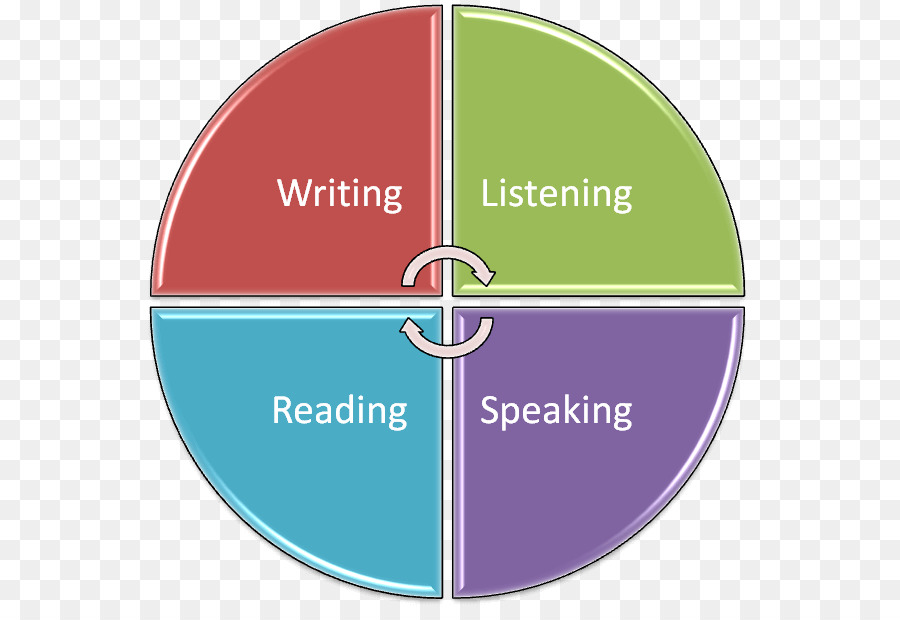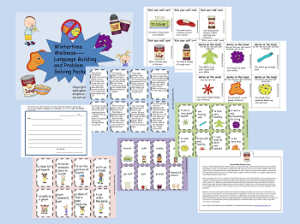 In the past a number of my SLP colleague bloggers (Communication Station, Twin Sisters SLPs, Practical AAC, etc.) wrote posts regarding the use of thematic texts for language intervention purposes. They discussed implementation of fictional texts such as the use of children’s books and fairy tales to target linguistic goals such as vocabulary knowledge in use, sentence formulation, answering WH questions, as well as story recall and production.
In the past a number of my SLP colleague bloggers (Communication Station, Twin Sisters SLPs, Practical AAC, etc.) wrote posts regarding the use of thematic texts for language intervention purposes. They discussed implementation of fictional texts such as the use of children’s books and fairy tales to target linguistic goals such as vocabulary knowledge in use, sentence formulation, answering WH questions, as well as story recall and production.
Today I would like to supplement those posts with information regarding the implementation of intervention based on thematic nonfiction texts to further improve language abilities of children with language difficulties.
First, here’s why the use of nonfiction texts in language intervention is important. While narrative texts have high familiarity for children due to preexisting, background knowledge, familiar vocabulary, repetitive themes, etc. nonfiction texts are far more difficult to comprehend. It typically contains unknown concepts and vocabulary, which is then used in the text multiple times. Therefore lack of knowledge of these concepts and related vocabulary will result in lack of text comprehension. According to Duke (2013) half of all the primary read-alouds should be informational text. It will allow students to build up knowledge and the necessary academic vocabulary to effectively participate and partake from the curriculum.
So what type of nonfiction materials can be used for language intervention purposes. While there is a rich variety of sources available, I have had great success using Let’s Read and Find Out Stage 1 and 2 Science Series with clients with varying degrees of language impairment.
Here’s are just a few reasons why I like to use this series.
- They can be implemented by parents and professionals alike for different purposes with equal effectiveness.
- They can be implemented with children fairly early beginning with preschool on-wards
- The can be used with the following pediatric populations:
- Language Disordered Children
- Children with learning disabilities and low IQ
- Children with developmental disorders and genetic syndromes (Fragile X, Down Syndrome, Autism, etc.)
- Children with Fetal Alcohol Spectrum Disorders
- Internationally adopted children with language impairment
- Bilingual children with language impairment
- Children with dyslexia and reading disabilities
- Children with psychiatric Impairments
- The books are readily available online (Barnes & Noble, Amazon, etc.) and in stores.
- They are relatively inexpensive (individual books cost about $5-6).
- Parents or professionals who want to continuously use them seasonally can purchase them in bulk at a significantly cheaper price from select distributors (Source: rainbowresource.com)
- They are highly thematic, contain terrific visual support, and are surprisingly versatile, with information on topics ranging from animal habitats and life cycles to natural disasters and space.
- They contain subject-relevant vocabulary words that the students are likely to use in the future over and over again (Stahl & Fairbanks, 1986).
- The words are already pre-grouped in semantic clusters which create schemes (mental representations) for the students (Marzano & Marzano, 1988).
For example, the above books on weather and seasons contain information on:
1. Front Formations
2. Water Cycle
3. High & Low Pressure Systems
Let’s look at the vocabulary words from(Source: ReadWorks):
Word: water vapor
Context: Steam from a hot soup is water vapor.
Word: expands
Context: The hot air expands and pops the balloon.
Word: atmosphere
Context: The atmosphere is the air that covers the Earth.
Word: forecast
Context: The forecast had a lot to tell us about the storm.
Word: condense
Context: steam in the air condenses to form water drops.
These books are not just great for increasing academic vocabulary knowledge and use. They are great for teaching sequencing skills (e.g., life cycles), critical thinking skills (e.g., What do animals need to do in the winter to survive?), compare and contrast skills (e.g., what is the difference between hatching and molting?) and much, much, more!
So why is use of nonfiction texts important for strengthening vocabulary knowledge and words in language impaired children?
As I noted in my previous post on effective vocabulary instruction (HERE): “teachers with many struggling children often significantly reduce the quality of their own vocabulary unconsciously to ensure understanding” (Excerpts from Anita Archer’s Interview with Advance for SLPs).
The same goes for SLPs and parents. Many of them are under misperception that if they teach complex subject-related words like “metamorphosis” or “vaporization” to children with significant language impairments or developmental disabilities that these students will not understand them and will not benefit from learning them.
However, that is not the case! These students will still significantly benefit from learning these words, it will simply take them longer periods of practice to retain them!
By simplifying our explanations, minimizing verbiage and emphasizing the visuals, the books can be successfully adapted for use with children with severe language impairments. I have had parents observe my intervention sessions using these books and then successfully use them in the home with their children by reviewing the information and reinforcing newly learned vocabulary knowledge.
Here are just a few examples of prompts I use in treatment with more severely affected language-impaired children:
- What do you see in this picture?
- This is a _____ Can you say _____
- What do you know about _____?
- What do you think is happening? Why?
- What do you think they are doing? Why?
- Let’s make up a sentence with __________ (this word)
- You can say ____ or you can say ______ (teaching synonyms)
- What would be the opposite of _______? (teaching antonyms)
- Do you know that _____(this word) has 2 meanings
- 1st meaning
- 2nd meaning
- How do ____ and _____ go together?
Here are the questions related to Sequencing of Processes (Life Cycle, Water Cycle, etc.)
- What happened first?
- What happened second?
- What happened next?
- What happened after that?
- What happened last?
As the child advances his/her skills I attempt to engage them in more complex book interactions
- Compare and contrast items
- (e.g. objects/people/animals)
- Make predictions and inferences about will happen next?
- Why is this book important?
“Picture walks” (flipping through the pages) of these books are also surprisingly effective for activation of the student’s background knowledge (what a student already knows about a subject). This is an important prerequisite skill needed for continued acquisition of new knowledge. It is important because “students who lack sufficient background knowledge or are unable to activate it may struggle to access, participate, and progress through the general curriculum” (Stangman, Hall & Meyer, 2004).
These book allow for :
1.Learning vocabulary words in context embedded texts with high interest visuals
2.Teaching specific content related vocabulary words directly to comprehend classroom-specific work
3.Providing multiple and repetitive exposures of vocabulary words in texts
4. Maximizing multisensory intervention when learning vocabulary to maximize gains (visual, auditory, tactile via related projects, etc.)
To summarize, children with significant language impairment often suffer from the Matthew Effect (“rich get richer, poor get poorer”), or interactions with the environment exaggerate individual differences over time
Children with good vocabulary knowledge learn more words and gain further knowledge by building of these words
Children with poor vocabulary knowledge learn less words and widen the gap between self and peers over time due to their inability to effectively meet the ever increasing academic effects of the classroom. The vocabulary problems of students who enter school with poorer limited vocabularies only worsen over time (White, Graves & Slater, 1990). We need to provide these children with all the feasible opportunities to narrow this gap and partake from the curriculum in a more similar fashion as typically developing peers.
Helpful Smart Speech Therapy Resources:
References:
Duke, N. K. (2013). Starting out: Practices to Use in K-3. Educational Leadership, 71, 40-44.
Marzano, R. J., & Marzano, J. (1988). Toward a cognitive theory of commitment and its implications for therapy. Psychotherapy in Private Practice 6(4), 69–81.
Stahl, S. A. & Fairbanks, M. M. “The Effects of Vocabulary Instruction: A Model-based Metaanalysis.” Review of Educational Research 56 (1986): 72-110.
Strangman, N., Hall, T., & Meyer, A. (2004). Background knowledge with UDL. Wakefield, MA: National Center on Accessing the General Curriculum.
White, T. G., Graves, M. F., & Slater W. H. (1990). Growth of reading vocabulary in diverse elementary schools: Decoding and word meaning. Journal of Educational Psychology, 82, 281–290.
 Today I’m excited to introduce a new product: “Creating A Learning Rich Environment for Language Delayed Preschoolers“. This 40 page presentation provides suggestions to parents regarding how to facilitate further language development in language delayed/impaired preschoolers at home in conjunction with existing outpatient, school, or private practice based speech language services. It details implementation strategies as well as lists useful materials, books, and websites of interest.
Today I’m excited to introduce a new product: “Creating A Learning Rich Environment for Language Delayed Preschoolers“. This 40 page presentation provides suggestions to parents regarding how to facilitate further language development in language delayed/impaired preschoolers at home in conjunction with existing outpatient, school, or private practice based speech language services. It details implementation strategies as well as lists useful materials, books, and websites of interest.
 With the passing of
With the passing of  LANGUAGE TESTING
LANGUAGE TESTING Today I am doing a product swap and giveaway with Rose Kesting of
Today I am doing a product swap and giveaway with Rose Kesting of 

 Need a L
Need a L Today I am very excited to introduce to you my brand new product which has been long in the making. “Speech Language Assessment of Older Internationally Adopted Children”. In the past I have written a number of articles and blog posts as well as done a number of presentations on related topics. I finally decided that it’s a great time to put it all together and created this 65 slide presentation which succinctly explains how to assess speech language abilities of older Internationally Adopted (IA) Children.
Today I am very excited to introduce to you my brand new product which has been long in the making. “Speech Language Assessment of Older Internationally Adopted Children”. In the past I have written a number of articles and blog posts as well as done a number of presentations on related topics. I finally decided that it’s a great time to put it all together and created this 65 slide presentation which succinctly explains how to assess speech language abilities of older Internationally Adopted (IA) Children. I have written about Response to Intervention (RTI) to intervention before (
I have written about Response to Intervention (RTI) to intervention before (